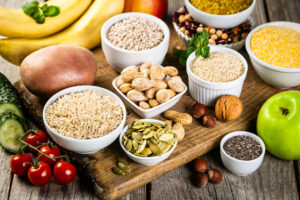How to Gain Weight With a High Metabolism
Some people struggle with putting on weight no matter how hard they try. Although there are some medical conditions such as hyperthyroidism[1] that affect how people absorb nutrients from their food, some people without a formal diagnosis simply feel they can’t gain weight no matter how hard they try. Some people are naturally skinny with low body fat because of predispositions like genetics, hormones, and/or a higher metabolism (including a higher basal metabolic rate). Aside from addressing potential medical concerns with a doctor, a shift in nutrition, supplementation, and exercise can help you gain weight with a high metabolism.
Protein
For someone with a high metabolism who wants to bulk up and gain weight while performing regular resistance workouts, the recommendation is at least 1.6 grams of protein per kg of body weight/0.73 grams of protein per pound of body weight a day. That is at least 124 grams of protein for a 170-pound person. Although scientific opinion varies, the long-term, sustainable recommendation is to stay at or below 2 grams of protein per kg of body weight/0.9 grams per pound of body weight to avoid digestive issues while maximizing benefits[2].
Tips to eat more protein:
-
-
- Supplement with protein shakes or protein bars
-
- Aim for 0.73-0.9 grams of protein per pound of body weight per day
- Eat protein-rich foods from this list[3] such as chicken, ground beef, and more
-
Creatine
Creatine is a naturally occurring compound in the body that consists of arginine, glycine, and methionine, three amino acids that aid in muscle contractions. Creatine increases strength, performance, and muscle growth. Clinical trials demonstrate that supplementing with creatine is effective for muscle growth, especially in healthy young adults who exercise[4]. It’s important to note that creatine is dehydrating, so drink extra water while taking it. Also note that creatine takes about 3 weeks to saturate your muscles when taking 5 grams per day, so you may not see or feel the benefits right away.
Tips to consume more creatine:
-
-
- Supplement with 5 grams of creatine powder or creatine gummies per day, even on non-training days
- Eat creatine-rich foods such as red meat like steak and ground beef
-
Carbs
Carbohydrates are important for energy. To fuel resistance exercises mentioned later in this article, people looking to gain weight with a high metabolism should eat a diet high in carbs[5]. Some versatile examples of carb choices are oatmeal, whole grains, potatoes, pasta, and fruit such as bananas. Eating more carbs while resistance training helps your body use carbs for fuel instead of burning fat and protein for fuel. This may help you gain weight and muscle rather than losing or maintaining weight.

Various carb sources
Top tip to eat more carbs:
-
- Drink your carbs- make smoothies. You can use vanilla or fruit-flavored protein powder in a fruit smoothie to satisfy both protein and carb needs at the same time
Calories
A calorie surplus is important for people who want to gain weight with a high metabolism. It may be best to add 200 to 500 extra calories per day above your maintenance calories to gain mostly muscle. However, if you want to gain weight and mass in general with less regard to staying lean, your calorie needs may be higher. Ultimately, calories are often referred to as energy, and energy is needed for muscles to grow. More calories can come from food, especially carbohydrates[5]. If you struggle with eating more calories, you can drink a lot of calories at a time through supplementation such as a high-calorie weight-gainer powder.
Tips to eat more calories:
-
-
- Eat 200-500 more calories per day for increasing lean mass, and 500 or more calories per day for increasing both lean and fat mass (or if struggling to gain any mass)
-
- Eat several times throughout the day
- Supplement with a high-calories weight-gainer powder
-
Resistance Training
Resistance training includes using resistance to challenge your muscles, including machines, bands, or weights. Resistance training increases strength and hypertrophy (muscle size) over time[6]. Training for weight gain is especially beneficial when combined with increased protein, creatine, carb, and calorie intake. Focus on progressive overload (increasing the weight over time), time under tension (slow and controlled repetitions) and performing sets until failure (until it’s too hard to do another rep). As you gain more muscle, your calories needs will increase, so be sure to factor that into your calculations over time if you want to continue gaining weight.

Resistance training with weights
Tips for resistance training:
-
-
- Invest in a gym membership or set up a home gym to use weights, machines, and resistance bands
-
- Perform more repetitions, progressive overload, and train until failure
- Stay consistent; if you’re busy, 10 minutes is always better than nothing
-
Conclusion
To gain weight with a high metabolism:
- Eat 0.73-0.9 grams of protein per pound of body weight per day by eating protein-rich foods and supplementing with protein powders and protein bars
- Supplement with 5 grams of creatine powder per day
- Drink your calories by making smoothies and supplementing with protein shakes or weight-gainer shakes
- Eat 200-500 more calories per day for increasing lean mass, or more than 500 calories per day for increasing both lean and fat mass
- Resistance train consistently, perform more repetitions, progressive overload, and train until failure
- Stay consistent!
References
[1]MedlinePlus. (2024). Hyperthyroidism. https://medlineplus.gov/hyperthyroidism.html
[2]Wu G. (2016). Dietary protein intake and human health. Food & function, 7(3), 1251–1265. https://doi.org/10.1039/c5fo01530h
[3] Strength From Scratch. (2025). 9 high protein foods to eat to increase strength. https://www.strengthfromscratch.com/2025/02/19/protein-intake-9-high-protein-foods-to-eat-to-increase-strength
[4] Wu, S. H., Chen, K. L., Hsu, C., Chen, H. C., Chen, J. Y., Yu, S. Y., & Shiu, Y. J. (2022). Creatine Supplementation for Muscle Growth: A Scoping Review of Randomized Clinical Trials from 2012 to 2021. Nutrients, 14(6), 1255. https://doi.org/10.3390/nu14061255
[5] Clark, N. (2005). Bulking Up: Helping clients gain weight healthfully. ACSM’s Health & Fitness Journal, 9(5), 15–19. https://doi.org/10.1097/00135124-200509000-00007
[6] Krzysztofik, M., Wilk, M., Wojdała, G., & Gołaś, A. (2019). Maximizing Muscle Hypertrophy: A Systematic Review of Advanced Resistance Training Techniques and Methods. International journal of environmental research and public health, 16(24), 4897. https://doi.org/10.3390/ijerph16244897
We may earn a portion from affiliate links, but we would never recommend a product we dont believe in




